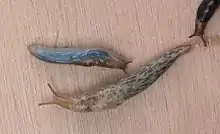Agriolimacidae
Agriolimacidae is a family of small and medium-sized land slugs, or shell-less snails, terrestrial pulmonate gastropod mollusks.
| Agriolimacidae | |
|---|---|
 | |
| The largest slug in the image is an individual of Deroceras reticulatum | |
| Scientific classification | |
| Kingdom: | Animalia |
| Phylum: | Mollusca |
| Class: | Gastropoda |
| Subclass: | Heterobranchia |
| Superorder: | Eupulmonata |
| Order: | Stylommatophora |
| Superfamily: | Limacoidea |
| Family: | Agriolimacidae H. Wagner, 1935[2] |
| Type genus | |
| Agriolimax Mörch, 1865 | |
| Diversity[3][4] | |
| 6 genera, about 135 species (123 species in Deroceras + at least 12 other species) | |
Distribution
Distribution of Limacidae is Holarctic,[1] this include: Nearctic, western Palearctic and eastern Palearctic.[5]
Agriolimacidae is the largest slug family, some are introduced all over the world, synanthropes are often severe pests.[1]

Anatomy
Most slugs in the family Agriolimacidae are rather small; only a few (in the genera Mesolimax and Krynickillus) are larger. Most are not more than 50 mm long.[1] The mantle is usually large, occupying approximately 1/3 of the entire body length, situated in the anterior part of the body.[1] The pneumostome is clearly postmedial.[1] The surface of the mantle in living slugs is covered in concentric, mobile wrinkles.[1] In addition sometimes there is a shallow, poorly defined groove which runs above the pneumostome on the right side, not passing to the left.[1]
The penis is short, usually bag-shaped, often with external appendages, inside with different stimulatory organs.[1] No tubular membrane encircles the penis and vas deferens.[1] The penis retractor muscle is situated beside the right tentacle.[1]
In this family, the number of haploid chromosomes lies between 26 and 30 (according to the values in this table).[6]
Taxonomy
The following two subfamilies have been recognized in the taxonomy of Bouchet & Rocroi (2005):
- subfamily Agriolimacinae H. Wagner, 1935[2] - synonym: Deroceratinae Magne, 1952
- subfamily Mesolimacinae Hausdorf, 1998
Genera
Genera within the family Agriolimacidae include:
subfamily Agriolimacinae
- Deroceras Rafinesque, 1820 - type genus described as Agriolimax Mörch, 1865
- Furcopenis Castillejo & Wiktor, 1983
- Krynickillus Kaleniczenko, 1851
subfamily Mesolimacinae
- Mesolimax Pollonera, 1888
- Mesolimax brauni Pollonera, 1888
subfamily ?
- Lytopelte Boettger, 1886
- Megalopelte Lindholm, 1914
Cladogram
A cladogram showing the phylogenic relationships of this family to other families within the limacoid clade:[5]
| limacoid clade |
| ||||||||||||||||||||||||||||||||||||||||||||||||||||||||||||||||||||||||||||||||||||||||||||||||||||||
References
This article incorporates public domain text from the reference.[1]
- "Family summary for Agriolimacidae". AnimalBase, last change 23-05-2010, accessed 4 August 2010
- Wagner, J. (1935). "Magyarország, Horvátország és Dalmácia hazátlan csigái (40 szövegrajzzal). II. rész". Annales historico-naturales Musei nationalis hungarici. Pars Zoologica. 29: 169–212.
- "Genera in family Agriolimacidae" [n = 6]. AnimalBase, accessed 10 September 2010.
- Wiktor, A. (2000). "Agriolimacidae (Gastropoda: Pulmonata): a systematic monograph". Annales Zoologici 49: 347-590. abstract
- Hausdorf B. (2000). "Biogeography of the Limacoidea sensu lato (Gastropoda: Stylommatophora): Vicariance Events and Long-Distance Dispersal". Journal of Biogeography 27(2): 379-390. doi:10.1046/j.1365-2699.2000.00403.x, JSTOR.
- Barker G. M.: Gastropods on Land: Phylogeny, Diversity and Adaptive Morphology. in Barker G. M. (ed.): The biology of terrestrial molluscs. CABI Publishing, Oxon, UK, 2001, ISBN 0-85199-318-4. 1-146, cited pages: 139 and 142.
External links
| Wikimedia Commons has media related to Agriolimacidae. |
- Slugs of Florida on the UF / IFAS Featured Creatures Web site